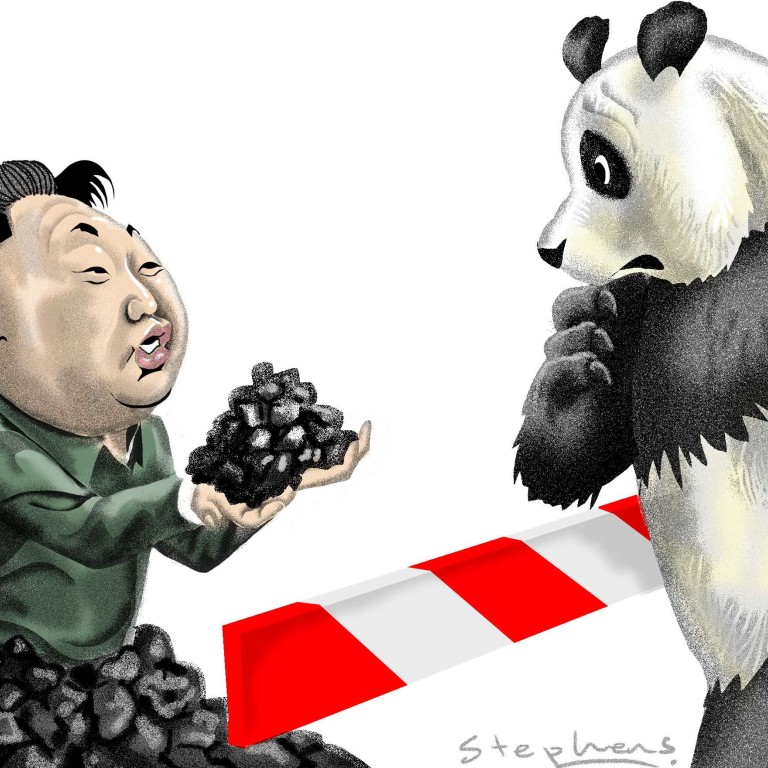
Will China enforce UN sanctions on North Korea this time?
Donald Kirk says the latest Security Council measures, which on paper could deprive Pyongyang of millions of dollars in export earnings, have no hope of achieving their intended aim without Beijing’s full cooperation

The latest sanctions mean that China has to slash imports of coal, North Korea’s biggest export, by more than half the previous level. The sanctions also ban the sale of a long list of minerals mined in the North’s mountainous terrain. Since 90 per cent of the North’s exports go to China, the Chinese bear the greatest responsibility for making sanctions work.
Russia also imports coal and minerals across its 17km border with North Korea leading to the mouth of the Tumen River and envisions much closer relations by land and sea through the Rason special zone, linked to Russia by a railway across the river.
Watch: North Korea claims successful nuclear warhead test
China and Russia, as permanent members of the Security Council, along with the US, Britain and France, have veto power over its resolutions. If they really objected to the sanctions, they could simply say no. Undoubtedly, they softened them in backstage talks before going along. They do, after all, have their own concerns about North Korea’s missile-and-nuclear programme. China, the source of virtually all North Korea’s oil and half its food, objects to the North’s begging for aid while wasting its resources on nukes and missiles.
Up to now, the Chinese, and also the Russians, have paid lip service to sanctions while vital products got into North Korea mostly across the Yalu River on the west and the Tumen River on the east. The Chinese appear to have resolved to do better, but, as Samantha Power, the US ambassador to the UN, once observed, “implementation is everything”.

The sanctions now in place should deprive North Korea of hundreds of millions of dollars a year that might be going into its nuclear programme, but there’s no guarantee they will be that much more effective than previous sanctions. That’s partly because much of the trade with China is informal if not technically illegal. Chinese business interests have long since learned how to evade sanctions, shipping products to North Korean contacts presumably with the full knowledge of Chinese officials who shrug and profess helplessness in efforts to stop them.
Why public calls for China to rein in North Korea risk backfiring

Under Trump, America can defuse the Korean nuclear crisis – with help from China and Russia
It’s not difficult to imagine that Chinese traders will still buy well over the limits set by sanctions on coal imports, which now account for 40 per cent of North Korean exports of about US$3 billion a year. Nor is it clear if Chinese companies, in joint ventures for mining North Korea’s mineral riches, will scale down their activities.
The enforcement problem is all the more difficult while South Korea goes through a leadership crisis in which the conservative president, Park Geun-hye, has lost authority and may lose her job.
Both China and Russia have objected strongly to Park’s decision, before she got embroiled in an ongoing corruption scandal surrounding her closest friend and top aides, to accept a US missile battery capable of targeting enemy missiles flying 100km above the Earth’s surface. If the Terminal High Altitude Area Defence (THAAD) system is installed next year as planned, neither is likely to want to cooperate fully on enforcing sanctions, regardless of how they voted on them in the Security Council.
Or they may choose to modulate the enforcement of sanctions while debate rages inside South Korea over THAAD. If Park is impeached or has to resign, her successor may spurn American advice on the need for THAAD, and much else.

To end North Korea’s nuclear push, we must first understand its fears
The sanctions, moreover, don’t cover aid for North Korea in the form of oil and food. China will continue to keep Pyongyang on life support by pumping oil in virtually free of charge while also shipping in food.
Power, on a recent visit to Seoul, spoke of the need to deprive the North of funds that it somehow keeps getting in numerous mysterious ways. The sanctions would restrict banking privileges for North Korean missions, place more North Korean wheeler-dealers on black lists and discourage countries from hiring North Koreans as cheap labour in mines, fields and factories.
These restrictions, though, won’t be enforceable. If certain figures are banned from doing business abroad, others will replace them. North Koreans will always be able to open bank accounts while sending thousands of its citizens overseas as cheap labour. Who’s going to stop them?
Still, the best hope is that the Chinese will at least be able to persuade the North Koreans to avoid doing anything rash – as indeed China has been doing all along with its calls for “stability” on the Korean peninsula.
Donald Kirk is the author of three books and numerous articles on Korea

